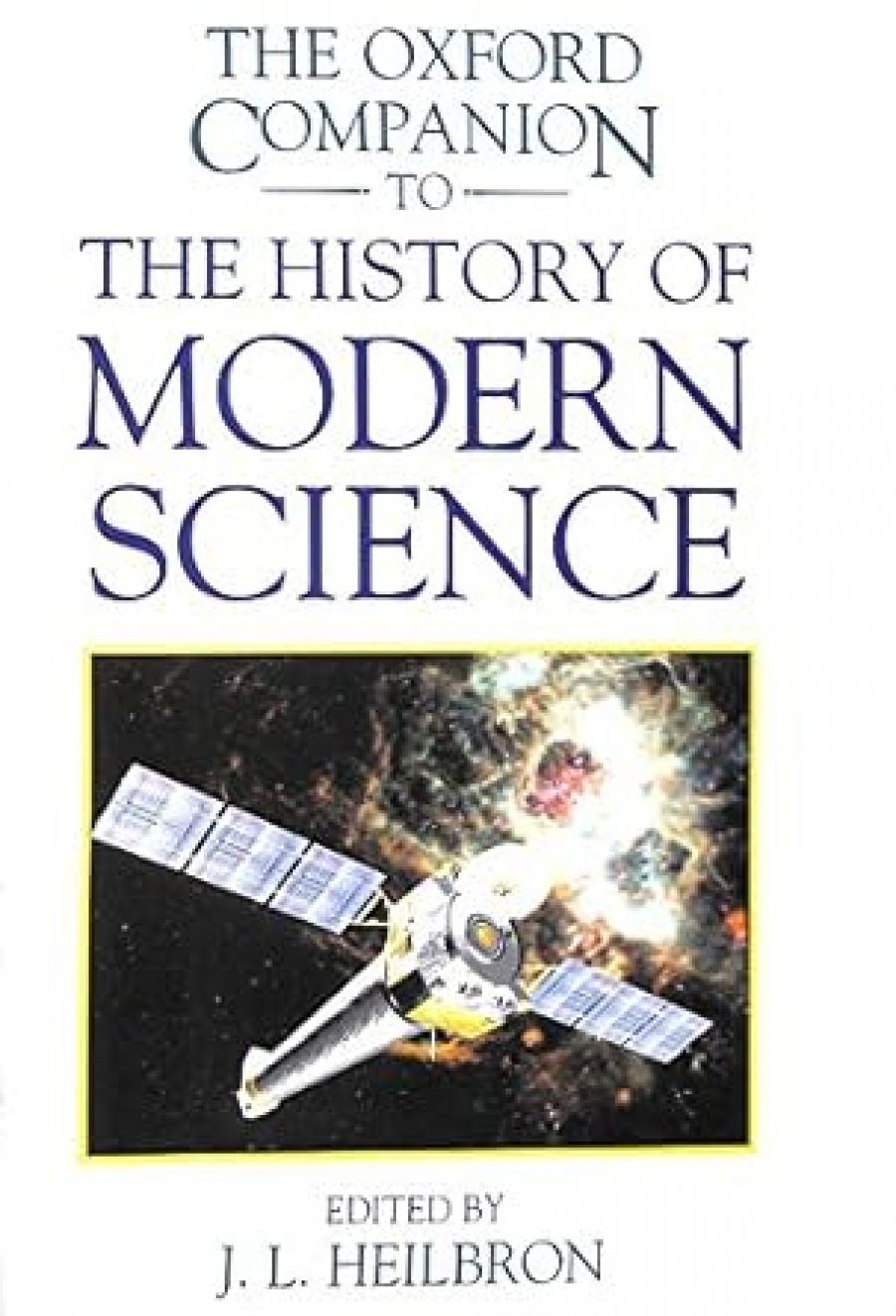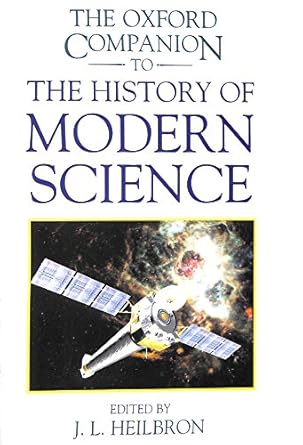
- Free Article: No
- Contents Category: Reference
- Review Article: Yes
- Article Title: Orreries and Putti
- Online Only: No
- Custom Highlight Text:
What should you expect from a companion? Resolute reliability? Occasional inspiration? Whimsical, even capricious distraction? I decided to start with my own pet subject, ethology, one that has a solid presence in the scientific discourse of the second half of the twentieth century, with contributions from Franz de Waal, Jane Goodall, Desmond Morris and Steven Rose, as well as from the three Nobel laureates recognised in 1973.
I lifted the hefty Oxford Companion to the History of Modern Science and found no section headed ‘ethology’. So I went to the front of the book seeking the less technical ‘animal behaviour’. No luck there, either. So to the index. Nothing. What about under ‘psychology’? But there is no such heading! Can psychology be too recent a discipline to qualify? Or insufficiently scientific? Only behaviourism and phenomenology sneak into this category.
- Book 1 Title: The Oxford Companion to the History of Modern Science
- Book 1 Biblio: OUP, $120 hb, 969 pp
- Book 1 Cover Small (400 x 600):

- Book 1 Cover (800 x 1200):

Yet there, at the back, was the list of Nobel Prizes and, yes, the names of Karl von Frisch, Konrad Lorenz and Niko Tinbergen, world-famous ethologists. Would they also be found somewhere in the body of another section? Once more to the index and there, finally, a brief paragraph mentioning all three laureates, under ‘instinct’. So, at my first attempt, the reliability factor scores low, on a topic the companion itself recognises as significant.
Try another tack. What about ‘Australia’? Only one mention in the index: of the now defunct ANZAAS (Australia and New Zealand Association for the Advancement of Science) a body that flourished for 109 years (I was president in 1992), but which faded in the late 1990s. Yet Australia is mentioned in passing in several references. While an index should never be cumbersome, it is surely the key to a useful companion.
Can my companion be inspiring? Better luck this time. Browsing at random, as one does, I come across a major piece about Subrahmanyan Chandrasekhar (1910–95), a physicist I have always intended to look up somewhere. Here is the tale of the Indian genius who worked out the limits to which giant stars could grow and what would happen to them when they collapsed, how they would form stupendously dense bodies, even black holes, and of how the scientific establishment dismissed his ideas, shattering his confidence and causing him to put aside his theory of limitations for thirty years. I happened to be reporting on the Chandra observatory at Harvard (named after the physicist), and remembered the biography during my interview. Chandrasekhar was vindicated in the 1960s, won the Nobel Prize in 1983 and is now secure in the Physics Hall of Fame. I was able to quote my newly acquired expertise to good advantage. Other entries popped up as I browsed, choice nuggets on fraud, hegemony, the primacy of English, even two pages on astrology, all written with clarity and succinctness.
What about the whimsical or the capricious? How about ‘Error and the Personal Equation’ (sources of mistakes, constant or accidental), ‘Orrery’ (which turns out to be an aid to astronomy such as models of the solar system), or ‘Putti in Science’ (angelic children or cherubs leaping about a scientific tableau)? Quaint, perhaps, but I would have preferred a page or two on ethology or psychology.
During my stint on the editorial board of a set of reference publications, including the Australian Encyclopaedia, my erudite chairman and mentor was Donald Horne. He, too, favoured short essays on chosen topics, but insisted that we stick to those we could reasonably expect readers to want to look up. Orreries and putti would have struggled to meet his criteria, but most entries in this elegant companion would have passed comfortably. Expect plenty bundled up in old-fashioned portmanteaus labelled ‘physics’ or ‘osmosis’ or ‘lightning’, but look elsewhere for companionship on our own history of science, or that of women (there is a section, notable for its brevity).
Jocelyn Bell is noted for making the startling discovery of pulsars for which her Cambridge professor received the Nobel Prize for physics. This appears twice. I once asked Dr Bell (now professor of astronomy at Britain’s Open University) whether she resented being so deprived; she replied with apparent serenity that she had ‘dined out on it ever since’ and so had received her due reward. Rosalind Franklin, upon whose work the discovery of the structure of DNA was based, is also well represented, as is the redoubtable Dorothy Crowfoot Hodgkin, the only woman from either Britain or Australia to win a Nobel Prize for science. But where are entries for our own Howard Florey (mentioned only in passing) or for Sir Richard Doll? These two Oxford men, through their research, saved more lives in the twentieth century than almost any other human beings I can think of – hundreds of millions, surely! Florey turned the mould of penicillin into a drug, Doll did the pioneering work in the 1950s which, for the first time, demonstrated that cigarettes caused cancer. Yet Doll is entirely absent. I saw him in Oxford in June. Now in his late eighties, he is lively as a whippet and seems oblivious to a lack of wider recognition, not least by the Nobel Committee in Stockholm.
So what is a companion like this for? It is less comprehensive than an encyclopedia or a dictionary, yet will surely provide eighty per cent of the informed user’s requirements. But who needs to know much about the history of science? This is a far more interesting and indeed important question.
We know that there is now, in Australia, Britain, the US and elsewhere, a virtual stampede away from the study of science at senior school and university. This may be because science is perceived as difficult and its professions largely underpaid. But part of the problem is the way the subjects are taught. An experiment in the US sought to find out why science degrees are not popular. Some bright, confident arts graduates were asked to start courses in physics and chemistry and to report back after a couple of terms. Being already well qualified, they had few doubts about their abilities but struggled nonetheless. When they reported back at the end of the experiment, all agreed that science itself is fine but that the courses were tedious. Two vital missing ingredients were some instruction about what science is for (why they should care about it) and on its history. This would not be to replace theoretical rigour with comfortable narrative, but, instead, to provide a human context for the ideas.
This could be the role of the Oxford Companion for students at school and university. No need for a tome on each topic when an essay will suffice. Science is now taught (and was for me) as a series of correct answers, as if the original workers in the field had nothing but eureka moments. In fact, the history of science is one of extraordinary perseverance against great odds. It is a human story. That is the inspiration of the subject and, with some eccentric lapses, the Oxford Companion serves it well.
The editor in chief is J.L. Heilbron, who divides his time between Berkeley, Oxford and Yale. The editorial committee is mainly from the US, with one or two members from Europe. They have overseen more than two hundred contributors, including three from Australian universities. The result is surprisingly even in style, and very readable. All the entries passed my tests of informed gossip and recent revelation.
There are no obvious mistakes beyond one thoughtfully provided on the first page of the preface, where ‘Noble Prize’ appears. It was pounced upon by reviewers oversees. God bless them!


Comments powered by CComment